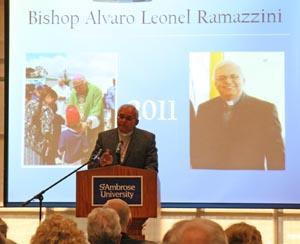
By Barb Arland-Fye
Worship of the gods of money, power and pleasure prevent the whole world from living the longed-for peace promised by Jesus, said Guatemalan Bishop Alvaro Leonel Ramazzini in accepting a peace award Oct. 2 in Davenport.
Bishop Martin Amos presented the Pacem in Terris Peace and Freedom Award to Bishop Ramazzini during a ceremony at St. Ambrose University. The award honors Blessed Pope John XXIII and commemorates his 1963 encyclical, “Pacem in Terris (Peace on Earth).
“As I receive this award I have in my heart and mind the men and women who, in Guatemala and elsewhere, struggle so that human rights will be respected,” said Bishop Ramazzini, who delivered an impassioned speech shaped by the encyclical’s principles. “Like those who have received this award before (Martin Luther King Jr., Dorothy Day, Mother Teresa, Cesar Chavez among them) we desire and hope for a different world — a peaceful world, founded on justice, truth, freedom and charity.”
Written two years after construction of the Berlin Wall and two months after the Cuban Missile Crisis, the encyclical emphasized the importance of respecting human rights, Bishop Ramazzini said. “To be a Christian is to defend and promote respect for human rights. To do otherwise is to risk being considered to be false and a hypocrite.”
While the Berlin Wall has fallen, new walls have been erected, he noted: on the border between the United States and Mexico, in the Palestinian territories, on the coast of the Mediterranean between Europe and Morocco. Even worse, “we human beings have created mental walls that separate and divide us — the walls of racism, of xenophobia, or unjust laws that treat immigrants as criminals and invaders.”
Because of economic models, political systems and business practices that favor the rich and exploit the poor, people in countries like Guatemala have no recourse but to immigrate to North America, Bishop Ramazzini said. “In the words of Blessed (Giovanni Battista) Scalabrini, if your own country does not give you the bread you need, you have the right to look for it in other places that are not your country.” Audience members responded with applause.
A champion of human rights for Guatemala’s most vulnerable communities, the bishop noted the unacceptable conditions his people endure: poverty, unjust work conditions, malnourishment, youth who do not see a better future on the horizon, farmers barely surviving and the menace of organized crime.
“We propose from our Christian experience a radical change in the way we live and understand Christianity. We want to live and understand it as a preferential option for the poor and dispossessed of the earth; as a constant search for the common good that now is also the global good,” Bishop Ramazzini said. He called for the “attentive and constant care of creation in order to leave to future generations a better, and not destroyed, planet; great efforts to live the communal and familial spirit in place of those individualistic attitudes that isolate and distance us from one another.”
Several Guatemalan students, studying at Scott Community College in Bettendorf, said after the bishop’s speech that his message addressed the realities of life in Guatemala.
Catarina Deleon, 19, and Gladis Yaneth Juc Ichich, 20, said Bishop Ramazzini has a reputation in Guatemala for advocating for the poor. Each woman is working on a study project to help eliminate malnutrition in her community. The students were thrilled the bishop addressed that issue.
“He was speaking to the realities of where we live,” Deleon said. “We consider him a role model. He shows us how we can act to help the community.” She appreciated his strong words about justice for immigrants, and so did Francisco “Fernando” Guarchaj, 21. People immigrate to the United States “to get a job and look for a better life. This is a great place to live,” Guarchaj said.
Sister Marilyn Schierbrock, CHM, who works with the poor in Davenport’s central city, appreciated Bishop Ramazzini’s talk for another reason: “It was reaffirming for what I’m doing in a small way — that involvement with people in need.”
Rabbi Henry Karp of Temple Emanuel in Davenport appreciated Bishop Ramazzini’s message, but was a little disappointed he didn’t address the audience from an interfaith perspective. Rabbi Karp also has a different perspective on the security fence separating the Palestinian territories from Israel. The fence serves as protection against terrorists, Rabbi Karp said. That’s not the case with the barrier between Mexico and the United States.
The rabbi serves on the interfaith Pacem In Terris Committee which selected Bishop Ramazzini for the award.
A full agenda for visiting bishop
Guatemalan Bishop Alvaro Leonel Ramazzini arrived a day later than anticipated, but made up for lost time by fulfilling a demanding agenda during his three-and-half day visit to the Davenport Diocese.
The 64-year-old bishop is the 41st recipient of the Pacem in Terris Peace and Freedom Award, presented to him Oct. 2 by Bishop Martin Amos of the Davenport Diocese.
Bishop Ramazzini arrived late afternoon Sept. 29. The following day he met with Bishop Amos, attended a press conference, met with staff at diocesan headquarters, had lunch with the Sisters of Humility in Davenport, spoke with students at Assumption High School in Davenport, visited with two Guatemalan students studying in Iowa and had dinner with a diocesan group whose members visited Guatemala a decade ago.
He presided at Mass at St. Patrick Church in Iowa City on Oct. 1 and at Spanish Mass at St. Mary Church in Davenport on Oct. 2, where he also participated in a potluck afterward. That afternoon, he accepted his award and gave a speech during a ceremony at St. Ambrose University in Davenport. A reception and dinner followed. He left Monday morning and planned to visit his mother in San Francisco. She celebrated her 88th birthday the week before.








